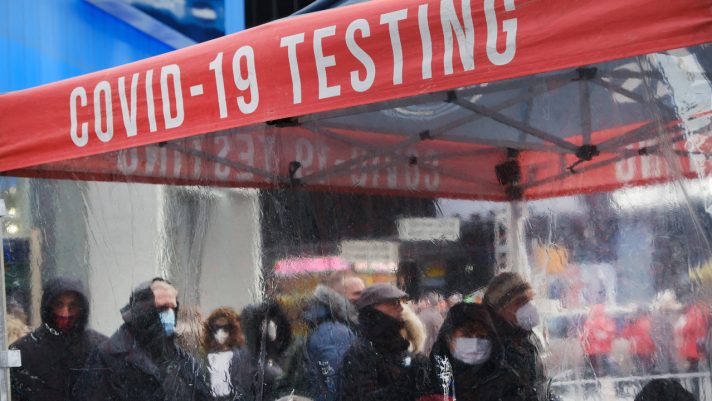By Editorial Board
The relief felt by many Nigerians following the reversal of travel restrictions the United Kingdom and Canada imposed on the country is instructive, because the restrictions were fraught with a lot of complications and inconvenience for those affected.
Beyond this, the Nigerian government and people should learn lessons not just of diplomacy but also of the need for more pro-action on the management of the COVID-19 pandemic.
The tension that engulfed the three countries while the restrictions lasted undoubtedly was caused by the discovery of the Omicron variant of the Coronavirus. But the variant is only the second in the pandemic going concerned that has shown no sign of abatement.
The possibility of more variants emerging is high; Nigeria should not be caught napping again and forced to go through sanctions by other countries; whether such actions are justified or not.
Government’s earlier inclination to retaliate against the UK, Canada and Saudi Arabia for their hasty ban on Nigeria was considered in the best interest of the nation. While every government has the duty to take, precautionary measures to protect the health or interest of its citizens, such measures should be reasonable in the circumstance and should contemplate international hegemony. They should be just and devoid of discrimination in any form.
The decision by these nations to place a ban on Nigerians seeking entry into their nations, whilst allowing the operation of commercial flights into and out of Nigeria for the benefit of its citizens and residents was unreasonable and purely discriminative. Moreover, the Omicron variant has been shown not to have originated from the African nations on the so-called red list; neither have they recorded the most infected cases.
The British government had on December 4 placed Angola, Botswana, Eswatini, Lesotho, Malawi, Mozambique, Namibia, Nigeria, South Africa, Zambia and Zimbabwe on its travel ban following the outbreak of the Omicron variant of COVID-19.
Earlier, Canada late November restricted travels from Nigeria and the nine other countries over the spread of the variant. Both countries had predicated their reversal of the restrictions on the assertion that they had served their purpose and were no longer needed.
“Now that there is community transmission of Omicron in the UK and Omicron has spread so widely across the world, the travel red list is now less effective in slowing the incursion of Omicron from abroad,” the UK Health Secretary, Sajid Javid told the parliament. The UK lifted its restrictions last Wednesday and Canada two days ago.
At the time the ban was announced, the virus had also been detected in a number of other European countries which to date were not included in the UK’s red list. It was therefore understandable why Nigerians and other affected countries complained that the actions were discriminatory against their citizens. After all, can the UK government say its citizens who are allowed to travel to and from Nigeria do not pose any health challenge to its public health? Why were repeated PCR tests and mandatory isolation for travellers at government-managed facilities not made an option?
In spite of the widespread criticism by stakeholders, with the Secretary-General of the United Nations, Antonio Guterres, referring to the policy as travel apartheid, the UK had insisted that its policy would be in place for at least three weeks before considering a review. The countries indeed were at liberty to determine policies considered to be most favourable to its interest. Whilst the foreign policy objectives of the Nigerian government as provided by its constitution includes the promotion and protection of its national interest, the promotion of international co-operation for the consolidation of universal peace and mutual respect among all nations. However, it equally stipulates the elimination of discrimination in all its manifestations, on the basis of which the Federal Government could justifiably take reciprocal actions.
Importantly, however, it is time African nations begin to look inwards and further the exploration of the vast resources at their disposal in managing COVID-19 and other ailments. How long will they continue to rely on the goodwill of the so-called big brother nations for donations or foreign pharmaceutical companies for the supply of vaccines as with most other amenities? What is the progress of Nigeria’s research on the production of a vaccine or other preventative or curative measures against the coronavirus?
It is no longer news that in spite of its poor health facilities, the mortality rate in Nigeria and most other African nations from the virus are very low compared to the deaths recorded in some European and Asian countries. While there have been speculations such as early lockdown, youthful population, climate environment resistance, under-reporting and a number of theories propounded as being responsible for the low death rate, none of these theories has been confirmed by the government. Is there ongoing research being funded by the government in this or any other area? Is there a homegrown remedy being explored by the government?
While it is understandable that the government would like to discourage the use of self-medication and other home-grown remedies without clinical trials, the people should be carried along on the progress of these researches. Many suggestions made by local health practitioners were later disclaimed by the government without providing any alternative. To make matters worse, the government has now gone ahead to implement punitive measures against unvaccinated Nigerians in spite of the shortage of these vaccines in health centres across the country. This is putting the cart before the horse. Efforts should be geared towards making these vaccines available and accessible to all.
The government should also realise that lack of information from it only serves to fuel these conspiracy theories that continue to encourage vaccine hesitancy. The doubts and scepticism being expressed by most are as a result of the many uncertainties trailing the vaccines. Government should do more in the area of advocacy with the aim of assuring its citizens of the safety and efficacy of the vaccines.
.
Kindly share this article:

